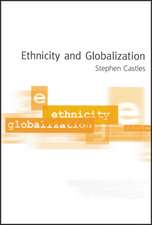Understanding Everyday Racism: An Interdisciplinary Theory: SAGE Series on Race and Ethnic Relations, cartea 2
Autor Philomena Esseden Limba Engleză Paperback – 18 sep 1991
Preț: 792.88 lei
Preț vechi: 966.92 lei
-18% Nou
Puncte Express: 1189
Preț estimativ în valută:
151.72€ • 158.81$ • 126.28£
151.72€ • 158.81$ • 126.28£
Carte tipărită la comandă
Livrare economică 31 martie-14 aprilie
Preluare comenzi: 021 569.72.76
Specificații
ISBN-13: 9780803942561
ISBN-10: 0803942567
Pagini: 336
Ilustrații: 1, black & white illustrations
Dimensiuni: 139 x 224 x 22 mm
Greutate: 0.44 kg
Ediția:1
Editura: SAGE Publications
Colecția Sage Publications, Inc
Seria SAGE Series on Race and Ethnic Relations
Locul publicării:Thousand Oaks, United States
ISBN-10: 0803942567
Pagini: 336
Ilustrații: 1, black & white illustrations
Dimensiuni: 139 x 224 x 22 mm
Greutate: 0.44 kg
Ediția:1
Editura: SAGE Publications
Colecția Sage Publications, Inc
Seria SAGE Series on Race and Ethnic Relations
Locul publicării:Thousand Oaks, United States
Cuprins
PART ONE: TOWARDS AN INTEGRATION OF MACRO AND MICRO DIMENSIONS OF RACISM
Racism Today
The Social-political Context
The Netherlands
Some Notes on Contemporary Racism in the US
Women and Racism
Black Women with Higher Education
Conceptualizing Racism as a Process
Racism
A Working Definition
The Notion of Everyday Racism
PART TWO: METHODOLOGICAL QUESTIONS
Introduction
Methodology within Methodology
Accounts
The Interviewees
Interviewing
Method of Analysis
PART THREE: KNOWLEDGE AND COMPREHENSION OF EVERYDAY RACISM
Introduction
General Knowledge and Scenarios of Racism
Comprehending Racism
Subjective and Objective Assessments of the Comprehension of Racist Events
A Procedure for the Assessment of Racist Events
Assessing Real-life Explanations of `Unfair Treatment'
Relating Cognitive to Social Processes of Understanding
The Acquisition of Knowledge of Racism
Reconstructing Black Women's General Knowledge of Racism
PART FOUR: ANALYZING ACCOUNTS OF RACISM
Introduction
Analyzing Accounts of Racism
Knowledge About Racism as an Evaluative Category in Verbal Accounts
Heuristics, Interpretations and Evaluations in Reconstructions of Racist Events
Racist Complications in Job Applications
What happened?
Examples of Real-life Accounts
Conclusions
PART FIVE: THE INTEGRATION OF RACISM IN EVERYDAY LIFE: THE STORY OF ROSA N.
Introduction
Rosa N.
A Fragmentary Representation of Everyday Racism
The Process of Everyday Racism in the Experience of Rosa N.
The Macro Context of Experiences of Racism
Conclusions
Rosa N. and the Shared Experience of Racism
PART SIX: THE STRUCTURE OF EVERYDAY RACISM
Racism as Conflict Maintaining Process
Hidden Agendas
The Dominations of Euro-American Values
The Basic Agenda
Perpetuation of Exclusion and Subordination
The Agenda of the Agenda
Problematizing those who Problematize Racism
The Structure of Everyday Racism
CONCLUSIONS
APPENDICES
Appendix 1. Interview Guide
Appendix 2. General Statements about Racism
Appendix 3. `Rosa N. File'
Racism Today
The Social-political Context
The Netherlands
Some Notes on Contemporary Racism in the US
Women and Racism
Black Women with Higher Education
Conceptualizing Racism as a Process
Racism
A Working Definition
The Notion of Everyday Racism
PART TWO: METHODOLOGICAL QUESTIONS
Introduction
Methodology within Methodology
Accounts
The Interviewees
Interviewing
Method of Analysis
PART THREE: KNOWLEDGE AND COMPREHENSION OF EVERYDAY RACISM
Introduction
General Knowledge and Scenarios of Racism
Comprehending Racism
Subjective and Objective Assessments of the Comprehension of Racist Events
A Procedure for the Assessment of Racist Events
Assessing Real-life Explanations of `Unfair Treatment'
Relating Cognitive to Social Processes of Understanding
The Acquisition of Knowledge of Racism
Reconstructing Black Women's General Knowledge of Racism
PART FOUR: ANALYZING ACCOUNTS OF RACISM
Introduction
Analyzing Accounts of Racism
Knowledge About Racism as an Evaluative Category in Verbal Accounts
Heuristics, Interpretations and Evaluations in Reconstructions of Racist Events
Racist Complications in Job Applications
What happened?
Examples of Real-life Accounts
Conclusions
PART FIVE: THE INTEGRATION OF RACISM IN EVERYDAY LIFE: THE STORY OF ROSA N.
Introduction
Rosa N.
A Fragmentary Representation of Everyday Racism
The Process of Everyday Racism in the Experience of Rosa N.
The Macro Context of Experiences of Racism
Conclusions
Rosa N. and the Shared Experience of Racism
PART SIX: THE STRUCTURE OF EVERYDAY RACISM
Racism as Conflict Maintaining Process
Hidden Agendas
The Dominations of Euro-American Values
The Basic Agenda
Perpetuation of Exclusion and Subordination
The Agenda of the Agenda
Problematizing those who Problematize Racism
The Structure of Everyday Racism
CONCLUSIONS
APPENDICES
Appendix 1. Interview Guide
Appendix 2. General Statements about Racism
Appendix 3. `Rosa N. File'
Descriere
This book compares contemporary racism in the US and the Netherlands through in-depth interviews with fifty-five black women. As an interdisciplinary analysis of gendered social constructions of racism, it breaks new ground. Essed problematizes and reinterprets many of the meanings and everyday practices that the majority of society has come to take for granted. She addresses crucial but largely neglected dimensions of racism: how it is experienced; how black women recognize its covert manifestations; how they acquire this knowledge; and how they challenge racism in everyday life. To answer these questions, over two thousand experiences of black women are analyzed within a theoretical framework that integrates the disciplines of macro- and


























